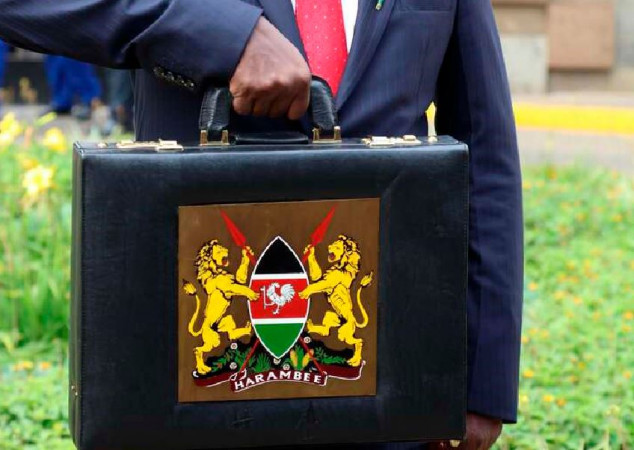How Sh3.6 trillion Budget will be funded and spent

Kenya is proposing to spend a total of Sh3.641 trillion to run President William Ruto’s administration’s 2023/24 Budget as the government stares at a tough balancing act between debt servicing and supporting economic recovery.
This will be the first full financial year under the Kenya Kwanza administration, which came to power after the August 9, 2022 election.
While the proposal is about Sh300 billion less than the current Budget, the amount is an increase from the Sh3.39 trillion Budget that the Jubilee administration had projected for the 2023/24 financial year.
From the spending plan, which will be tabled in Parliament in June, Sh2.433 trillion will go to recurrent expenditure, while Sh796.4 billion will be spent on development programmes.
Kenya Kwanza’s economic recovery agenda is geared towards increasing investment in at least five sectors envisaged to have the largest impact and linkages to the economy and household welfare. These sectors are expected to increase the employment rate. They are agriculture, Micro, Small and Medium Enterprise (MSME), housing and settlement, healthcare as well as the digital superhighway and the creative industry.
Economic recovery
“Special focus will be placed on increased employment, more equitable distribution of income, and social security while also expanding the tax revenue base, and increasing foreign exchange earnings,” the Cabinet Secretary for the National Treasury Njuguna Ndung’u said in the draft Budget Policy Statement (BPS).
The implementation of these interventions is expected to stimulate economic recovery to 6.1 per cent growth in 2023 from the estimated 5.5 per cent in 2022.
The national government will have a proposed budgetary allocation of Sh2.2 trillion, with the Executive arm taking a significant portion — Sh2.132 trillion or 63 per cent of the total Budget.
Parliament and the Judiciary have been allocated Sh39.9 billion and Sh20.07 billion, respectively. Devolved units will be allocated Sh375 billion, while about Sh864.13 billion will be used under the Consolidated Fund.
Ruto’s budget and policy implementation programme is expected to fulfil his pro-poor campaign promises by mainly supporting the informal sector, agriculture and human capital, which are in turn expected to drive the country’s economic recovery.
The Sh3.641 trillion Budget will be supported by an aggressive tax regime under which the Kenya Revenue Authority (KRA) will be tasked to collect about Sh2.9 trillion.
The Ruto administration expects to borrow about Sh695.2 billion to seal its Budget deficit, with Sh198.6 billion being borrowed externally while the remaining Sh496.6 billion will be sourced domestically from institutions such as banks.
New curriculum
Potential lenders are, however, likely to demand higher interest rates to cover the margins caused by the weakening shilling, declining forex reserves and inflationary pressure, meaning the government could face some difficulties in borrowing to seal the deficit.
The Budget projection shows that the education sector will take the lion’s share, at Sh580.57 billion, an increase of Sh36.05 billion from the current Budget. This highlights the cost of transitioning to the new education curriculum that is expected to start next month, which will require the Teachers Service Commission to hire more teachers and the Ministry of Education to expand learning infrastructure, including classrooms and laboratories for the Junior Secondary Schools (JSS). University funding, students loan, and subsidising fees for secondary schools are also set to take a significant chunk of the allocation to education.
The energy sector as well as the public administration and international relations (PAIR) programmes will take Sh398.3 billion and Sh371.4 billion respectively.
Agriculture, given about Sh67.7 billion, is one of the sectors that will receive the lowest funding should the projections get parliamentary approval.
Social protection and general economic and commercial affairs will get the least allocations.
More taxes
The revised revenue projections, an increase compared to estimates in the 2022 Budget Policy Statement, are largely due to the Treasury’s expectation for improved economic performance in the near term. Ordinary revenues are expected to amount to Sh2.6 trillion, up from the estimated Sh2.2 trillion in FY 2022/23.
“Revenue performance will be underpinned by the on-going reforms in tax policy and revenue administration measures geared towards expanding the tax base,” Ndung’u said.
KRA will implement, among others, a tax base expansion in the informal sector, integrate its tax system with telecommunication companies and impose tax on rental property.
KRA now has access to betting firms’ systems in a raft of changes that will enable it to have real-time computation of taxes.
The Treasury is further hoping the taxman will collect more excise taxes from cigarettes, alcoholic products, fruit juices and bottled water. Excise stamp fees for these products are already set to increase by almost double from March if Treasury’s proposal is approved. The draft BPS 2023 does not, however, highlight plans for wealth tax despite experts projecting that it could offer more revenues to the government.
President Ruto recently reignited debate on whether Kenya’s super-rich should pay higher taxes, but this is yet to take shape at policy level. According to the charitable organisation, Oxfam International, Kenya’s four richest people control a combined net worth of Sh333 billion, representing about a tenth of the national annual Budget.
“The analysis shows that the increasing extreme wealth of the rich and increasing extreme poverty of the poor driven by low taxes on the richest Kenyans by virtue of tax breaks, incentives, avoidance and evasion, alongside unfairly higher taxes on poorest Kenyans, directly through income tax and indirectly through taxes on fuel, food and basic commodities, is a social ill and a shame,” said Oxfam Kenya Country Director John Kitui.
Ruto’s administration intends to reduce wasteful spending and consumption subsidies. It has already partly scrapped the fuel subsidy even as it retains subsidies on fertilisers aimed at bringing down food prices.
Fiscal consolidation, which started last October, aims at freeing resources to service debt, the highest gobbler of tax revenue. The National Treasury has issued guidelines on suspending expenditure in some recurrent areas, such as domestic and foreign travel, communication and training.
Reduce deficit
Some of the measures are likely to impact negatively on the government’s delivery of services to Kenyans as the State scraps stationery supplies and instead advises civil servants to adopt email as the preferred mode of communication, a significant break from the traditional way of conducting government business.
Budget rationalisation is projected to reduce the fiscal deficit to 5.8 per cent of GDP in the financial year 2022/23 Budget from 6.2 per cent of GDP in the current Budget that the Jubilee government approved. The deficit is anticipated to decline further to 4.3 per cent of GDP in the FY 2023/24 Budget and 3.5 per cent of GDP over the medium term.
The Budget preparation is coming at a time when Kenya is facing numerous economic shocks from both domestic and external markets. Lingering effects of the Covid-19 pandemic, global recession and the tightening of monetary policy by the big economies could increase volatility in the financial market and hinder economic growth.












